Bipolar disorder with mixed episodes can be a complex and overwhelming challenge. In this specific form of bipolar disorder, individuals experience a combination of symptoms associated with both depressive and manic (or hypomanic) episodes simultaneously or in rapid succession.
This condition profoundly affects individuals, influencing their daily lives, careers, and relationships. Approximately 40% of patients with bipolar disorder experience mixed episodes, defined as a manic state with depressive features or manic symptoms in a patient with bipolar depression.
Managing the turbulent waters of bipolar disorder with mixed episodes often requires a vigilant awareness of the diverse and intense symptoms and a tailored treatment approach that can offer the compass toward stability and emotional well-being.
Key Takeaways:
Children whose fathers have bipolar disorder face a higher risk of developing the condition, underscoring the role of fathers in passing on the disorder to the next generation.
Bipolar disorder with mixed episodes can be triggered by stressful life events, acting as potent stressors that activate symptoms.
Bipolar mixed episodes create a turbulent emotional and behavioral landscape, blending manic and depressive aspects of the disorder into a unique experience.
Diagnosing bipolar disorder mixed episodes involves diagnostic tests and interviews but also presents challenges, including the potential for misdiagnosis.
The primary approach to treating bipolar disorder mixed episodes typically combines medications and psychotherapy for comprehensive care.
What Are Bipolar Mixed Episodes?
Bipolar mixed episodes are a unique face of bipolar disorder. They entail experiencing symptoms of both mania and depression simultaneously or in quick succession. While most forms of bipolar disorder involve alternating between elevated and depressed moods over time, mixed episodes introduce a challenging twist as the highs and lows coexist.
These episodes are expected, with many individuals with bipolar disorder encountering some mania symptoms during depressive episodes. Interestingly, those who develop bipolar disorder early in life, particularly during adolescence, may have a higher likelihood of experiencing mixed episodes.
It's worth noting that individuals can also have bipolar disorder with mixed features, including symptoms of low-grade mania, even if they don't meet the full criteria for bipolar disorder. This scenario is a manic episode of mixed depression or a unipolar depressive episode with mixed features.
Get Started With Nuview Treatment Center
Our dedicated professional staff is here to guide you or your loved one on the journey to lasting recovery, offering support every step of the way.
Differentiating Mixed Episodes from Mania and Depression
Bipolar mixed episodes, a complex face of bipolar disorder, require differentiation from pure mania and depression. An elevated mood episode typifies mania, heightened self-confidence, increased energy, and racing thoughts. During a manic or hypomanic episode, people often exhibit impulsive behaviors such as excessive spending or substance abuse.
In contrast, depressive episodes are characterized by persistent sadness, hopelessness, extreme fatigue, diminished interest in once-pleasurable activities, poor concentration, and, in severe instances, contemplation of self-harm or suicide. Sleep disturbances and appetite changes are typical during depressive episodes.
What Sets Mixed Episodes Apart?
Mixed episodes distinguish themselves by presenting a unique combination of symptoms from both manic and depressive poles.
While individuals in these states may encounter the heightened energy and confidence associated with mania, these moments are tinged with simultaneous despair and depression. This interaction of conflicting mood episodes defines mixed episodes, separating them from purely depressive or manic episodes.
Recognizing mixed episodes is imperative for effective treatment, as they necessitate a distinct approach compared to unipolar experiences of mania or depression.
What Are the Causes of Bipolar Mixed Episodes
Bipolar mixed episodes are puzzling in bipolar disorder, resulting from a complicated interaction of different factors. Knowing these causes is essential for understanding how these episodes, which combine high and low moods, happen.
Genetic Factors
Bipolar mixed episodes have a strong genetic component, and understanding the role of family history is crucial. Studies have revealed intriguing insights into how bipolar disorder can be inherited and how parental factors influence its occurrence.
Father's Influence:
While the genetic predisposition to bipolar disorder is often associated with mothers, recent studies have shed light on the paternal side. Research with extensive sample sizes has shown that the risk of bipolar disorder is higher in children whose fathers have the condition. This finding highlights the significant role of fathers in transmitting the disorder to the next generation.
First-Degree Relatives:
Individuals with a family history of bipolar disorder, including siblings and children, face a significantly heightened risk of developing the condition themselves. The risk of experiencing mixed episodes, a distinct aspect of bipolar disorder, is notably increased in those with close relatives who have the condition. Bipolar disorder in the family creates a genetic predisposition, making it more likely for subsequent generations to encounter bipolar mixed episodes.
Generational Variability:
Bipolar disorder can exhibit generational variability, meaning it might skip a generation. In some families, the disorder may not manifest in one generation but reappear in the next.
Environmental Triggers
While genetic factors play a significant role in bipolar mixed episodes, environmental triggers are equally important in understanding this complex condition.
Researchers have explored how certain environmental factors can act as catalysts for the onset of bipolar disorder, particularly mixed episodes.
Three main categories of environmental triggers stand out:
Stressful Life Events:
Stressful circumstances or life events can trigger bipolar disorder in susceptible individuals. These events may include experiences like grief due to the loss of a family member, traumatic incidents, job loss, the birth of a child, or even relocating to a new home. Such events can act as powerful stressors that set off the symptoms of bipolar disorder.
Physical Factors:
Environmental elements, including physical factors like pollution, working conditions, and weather conditions, also impact mental health. These factors may not directly cause bipolar disorder but can exacerbate symptoms and trigger episodes in those already predisposed.
Social Factors:
Social factors such as abuse, inadequate support systems, and toxic relationships can significantly influence an individual's mental health. These adverse social environments can create stress and instability, increasing the risk of bipolar mixed episodes.
Moreover, additional factors like a lack of mental stimulation, limited access to green outdoor spaces, or cluttered living environments can indirectly affect an individual's mental well-being.
Symptoms of Bipolar Mixed Episodes
Bipolar mixed episodes are characterized by a distinct combination of symptoms that reflect both manic and depressive aspects of the disorder. This unique blend creates a turbulent emotional and behavioral landscape for individuals experiencing these episodes.
Understanding the symptoms is crucial for diagnosis and providing appropriate treatment.
Emotional Symptoms
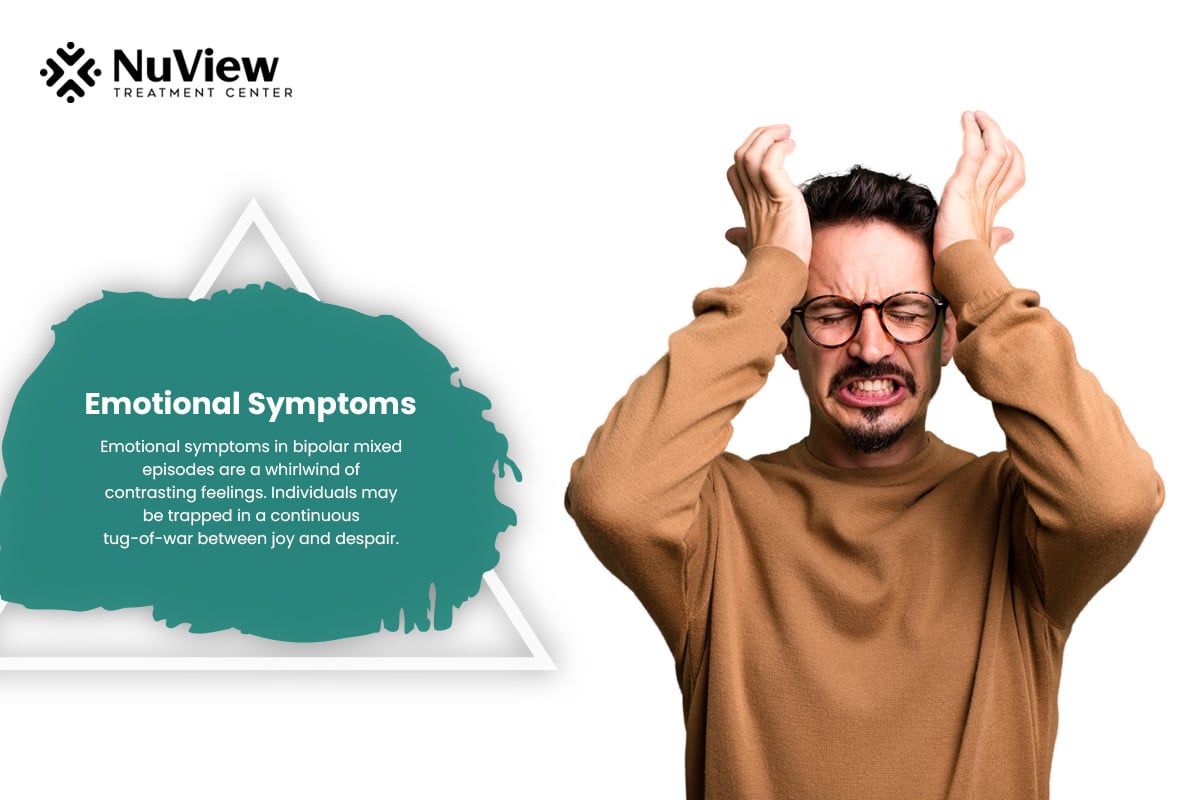
Emotional symptoms in bipolar mixed episodes are a whirlwind of contrasting feelings. Individuals may be trapped in a continuous tug-of-war between joy and despair.
These emotional roller coasters can include:
Irritability: A prominent emotional symptom is irritability. Individuals might feel persistently agitated and quick to anger even in seemingly calm situations.
Intense Sadness: Alongside irritability, there is an overwhelming sense of sadness. This deep melancholy is often intertwined with the high energy levels associated with mania.
Anxiety: Anxiety and restlessness are common during mixed episodes. The mind races with worrisome thoughts, contributing to the emotional turmoil.
Agitation: A heightened agitation, often accompanied by anxiety, is a significant emotional symptom. Individuals may feel as if they are in a constant state of unease.
Desperation: Feelings of desperation can be prevalent. Individuals may experience a sense of hopelessness and despair, even when their energy levels are elevated.
Rapid Mood Swings: Rapid and intense mood swings are characterized by mixed episodes. These mood shifts can occur within minutes or hours, adding to the emotional instability.
Behavioral Symptoms
Behavioral symptoms during bipolar mixed episodes are equally turbulent. Individuals often exhibit erratic and unpredictable actions, which can have far-reaching consequences.
Common behavioral symptoms include:
Impulsivity: Impulsivity is a critical behavioral characteristic. Individuals may engage in rash decisions with little consideration of the consequences. This can lead to risky behaviors such as excessive spending, substance abuse, or dangerous activities.
Restlessness: Restlessness is prevalent during mixed episodes. Individuals often have a surplus of energy but may struggle to focus or engage in productive activities. This restlessness can lead to pacing, fidgeting, or agitation.
Aggressive Behavior: Aggression may surface as a response to the irritability and frustration experienced in mixed episodes. This can strain relationships and pose challenges in various aspects of life.
Increased Talkativeness: A common behavioral symptom is an excessive need to talk or rapid speech. Individuals may have racing thoughts and talk excessively without realizing the impact on those around them.
Decreased Need for Sleep: In mixed episodes, there is often a reduced need for sleep. Individuals may go without sleep for extended periods, leading to sleep deprivation.
Difficulty Concentrating: Concentration and focus can be impaired. Due to fluctuating thoughts and emotions, individuals may need help completing tasks or following through on commitments.
Get Started With Nuview Treatment Center
Treatment Options for Mixed Episodes
Bipolar mixed episodes are challenging, but there are effective treatments available. The primary treatment approach typically involves a combination of medications and psychotherapy.
It's important to remember that finding the right treatment may take time, and the individual's response to treatments can vary.
Medication Management
Medications play a critical role in managing the symptoms of bipolar mixed episodes. These episodes require a different approach compared to pure manic or depressive states.
Here are some medications often used in the management of mixed episodes:
Mood Stabilizers: Medications like lithium, valproate, and lamotrigine are commonly used to stabilize mood and prevent the extremes of mania and depression. They help even out the emotional highs and lows, making mixed episodes less severe.
Antipsychotics: Atypical antipsychotics such as olanzapine, quetiapine, and aripiprazole reduce manic symptoms. They can be used in combination with mood stabilizers to manage mixed episodes.
Antidepressants: In some cases, healthcare providers may cautiously prescribe antidepressants to address severe depressive symptoms within a mixed episode. However, this is often done alongside mood stabilizers to prevent triggering mania.
Benzodiazepines: These are short-term options for managing agitation, anxiety, or insomnia during mixed episodes. However, they are typically used for brief periods due to the risk of dependence.
Antidepressant-antipsychotic Combination: Medications like quetiapine combined with an antidepressant can effectively address both manic and mixed episodes of bipolar disorder.
Electroconvulsive Therapy (ECT): In severe cases where medications prove ineffective or pose risks, healthcare providers may explore electroconvulsive therapy (ECT). This treatment involves controlled electrical currents to induce a brief seizure, which can positively impact mood regulation.
Psychotherapy Approaches

In addition to medication management, psychotherapy (talk therapy) is a valuable component of treating bipolar mixed episodes. These therapeutic approaches help individuals better understand their condition, manage symptoms, and develop coping strategies.
Here are some psychotherapy approaches commonly used for individuals experiencing mixed episodes:
Cognitive-Behavioral Therapy (CBT): CBT is a structured approach that helps individuals recognize and change negative thought patterns and behaviors. In bipolar mixed episodes, CBT can assist in managing mood swings, reducing impulsivity, and preventing relapses.
Dialectical Behavior Therapy (DBT): DBT combines cognitive-behavioral techniques with mindfulness strategies. It benefits individuals with bipolar disorder by focusing on emotional regulation, interpersonal effectiveness, distress tolerance, and acceptance.
Interpersonal and Social Rhythm Therapy (IPSRT): IPSRT emphasizes maintaining regular daily routines and managing interpersonal relationships. This therapy helps individuals stabilize their daily rhythms and reduce stressors that can trigger mixed episodes.
Family-Focused Therapy: Involving family members can be integral to treating bipolar mixed episodes. Family-focused therapy educates loved ones about the condition, improves communication, and builds a support system for the individual.
Psychoeducation: Psychoeducation sessions provide individuals with information about bipolar disorder symptoms and triggers. Education can empower individuals to recognize early warning signs and adhere to treatment plans.
Supportive Therapy: Supportive therapy offers a safe and nonjudgmental space for individuals to express their feelings and experiences. It can help them process the challenges they face during mixed episodes.
Experience a Holistic Approach to Bipolar Disorder at NuView Treatment Center
At NuView Treatment Center, we comprehend the distinctive hurdles posed by Bipolar Disorder accompanied by mixed episodes, and our services are thoughtfully customized to address these unique needs.
Our highly experienced team is clinically proficient and comprises compassionate individuals who are genuinely dedicated to assisting you in regaining control over your life.
We adopt a comprehensive approach that recognizes you as an individual with aspirations, apprehensions, dreams, and difficulties rather than merely a case or statistic.
If you're contemplating the next steps, don't hesitate to contact us today.
FAQs About Bipolar Mixed Episodes
Are Mixed Episodes Permanent?
Mixed episodes are not permanent. They are a distinct phase within bipolar disorder and can vary in duration. Some individuals may experience brief mixed episodes, while others may have longer or more frequent episodes. Proper treatment and management, often involving medication and therapy, can help individuals navigate through mixed episodes and work towards more stable and balanced periods.
How to Support Someone Experiencing a Mixed Episode?
Supporting someone during a mixed episode involves several essential actions. Firstly, educating yourself about bipolar mixed episodes and their manic and depressive symptoms is crucial for providing adequate support.
Sometimes, during mixed episodes, individuals need a listening ear. Be there for them, ready to listen without judgment, which can provide immense comfort. Establishing a daily routine can offer stability and structure during these challenging times, helping them regain some control.
Also, create an environment that fosters a feeling of safety, where they can openly express their thoughts and emotions. Finally, with their consent, involve their treatment team by coordinating with healthcare providers.
Can Diet and Lifestyle Choices Affect Mixed Episodes?
Yes, diet and lifestyle choices can influence mixed episodes. While not a substitute for medical treatment, they can complement it. Factors to consider include balanced nutrition, regular exercise, adequate sleep, stress management, and avoiding triggers. Consult healthcare professionals for a comprehensive treatment plan.
People Also Search:
Am I Bipolar | Bipolar Schizoaffective Disorder | Bipolar Disorder ICD 10 | Bipolar 1 | Bipolar 2 | Bipolar 1 vs 2 | Celebrities With Bipolar Disorder | What Causes Bipolar Disorder | Bipolar Disorder Symptoms In Females | Supportive Therapy for Bipolar Disorder | Does Bipolar Get Better With Age | How To Tell If A Bipolar Man Loves You
- What Are Bipolar Mixed Episodes?
- Differentiating Mixed Episodes from Mania and Depression
- What Are the Causes of Bipolar Mixed Episodes
- Symptoms of Bipolar Mixed Episodes
- Treatment Options for Mixed Episodes
- Experience a Holistic Approach to Bipolar Disorder at NuView Treatment Center
- FAQs About Bipolar Mixed Episodes
- What Are Bipolar Mixed Episodes?
- Differentiating Mixed Episodes from Mania and Depression
- What Are the Causes of Bipolar Mixed Episodes
- Symptoms of Bipolar Mixed Episodes
- Treatment Options for Mixed Episodes
- Experience a Holistic Approach to Bipolar Disorder at NuView Treatment Center
- FAQs About Bipolar Mixed Episodes
Get Help Today!
Muneer A. (2017). Mixed States in Bipular Disorder: Etiulogy, Pathogenesis and Treatment. Chonnam medical journal, 53(1), 1–13. https://doi.org/10.4068/cmj.2017.53.1.1
Sulé, E., Garriga, M., Valentí, M., & Vieta, E. (2017). Mixed features in bipular disorder. CNS spectrums, 22(2), 134–140. https://doi.org/10.1017/S1092852916000869
Özdemir, O., Coşkun, S., Aktan Mutlu, E., Özdemir, P. G., Atli, A., Yilmaz, E., & Keskin, S. (2016). Family History in Patients with Bipular Disorder. Noro psikiyatri arsivi, 53(3), 276–279. https://doi.org/10.5152/npa.2015.9870
Eisner, L., Eddie, D., Harley, R., Jacobo, M., Nierenberg, A. A., & Deckersbach, T. (2017). Dialectical Behavior Therapy Group Skills Training for Bipular Disorder. Behavior therapy, 48(4), 557–566. https://doi.org/10.1016/j.beth.2016.12.006
Everyone is Welcome Here and We All Have Your Back
Your healing journey deserves a personalized approach. At NuView, we integrate expertise in behavioral therapy, mental health, and substance use treatment to create a customized recovery plan tailored to your unique needs.
Connect with our Admissions Specialists today.
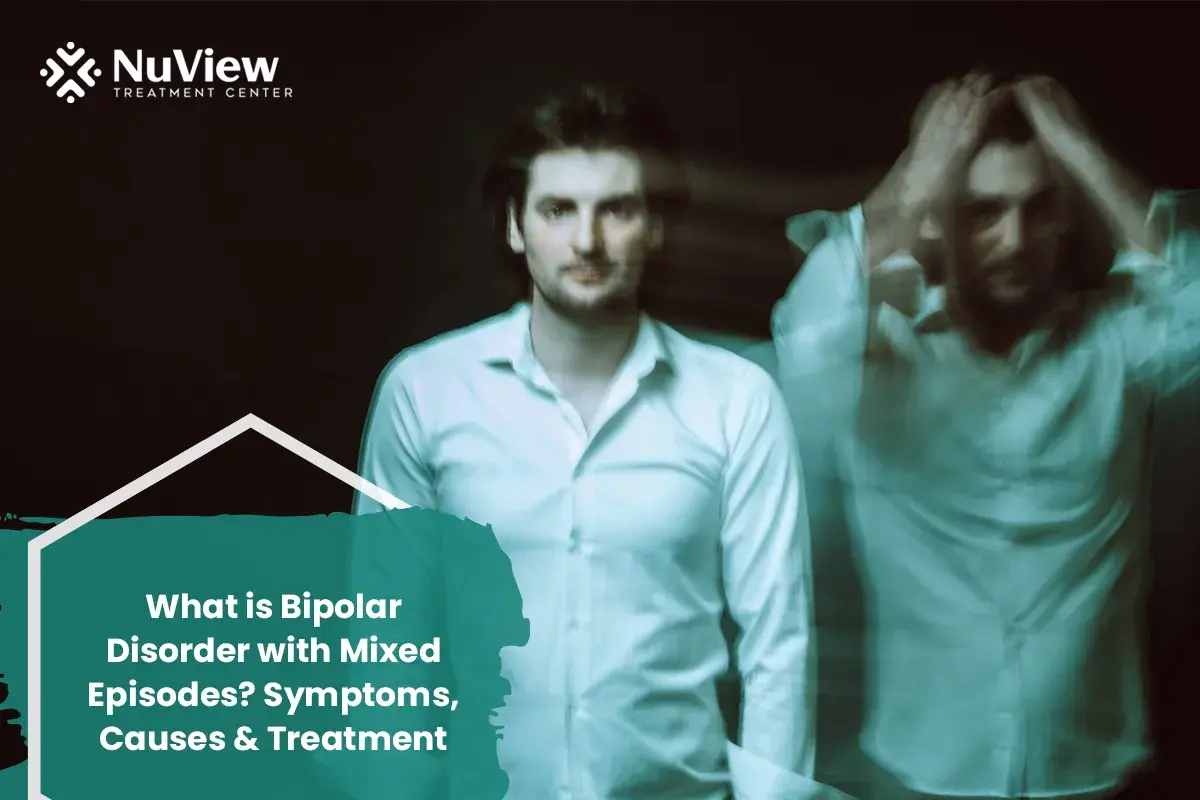
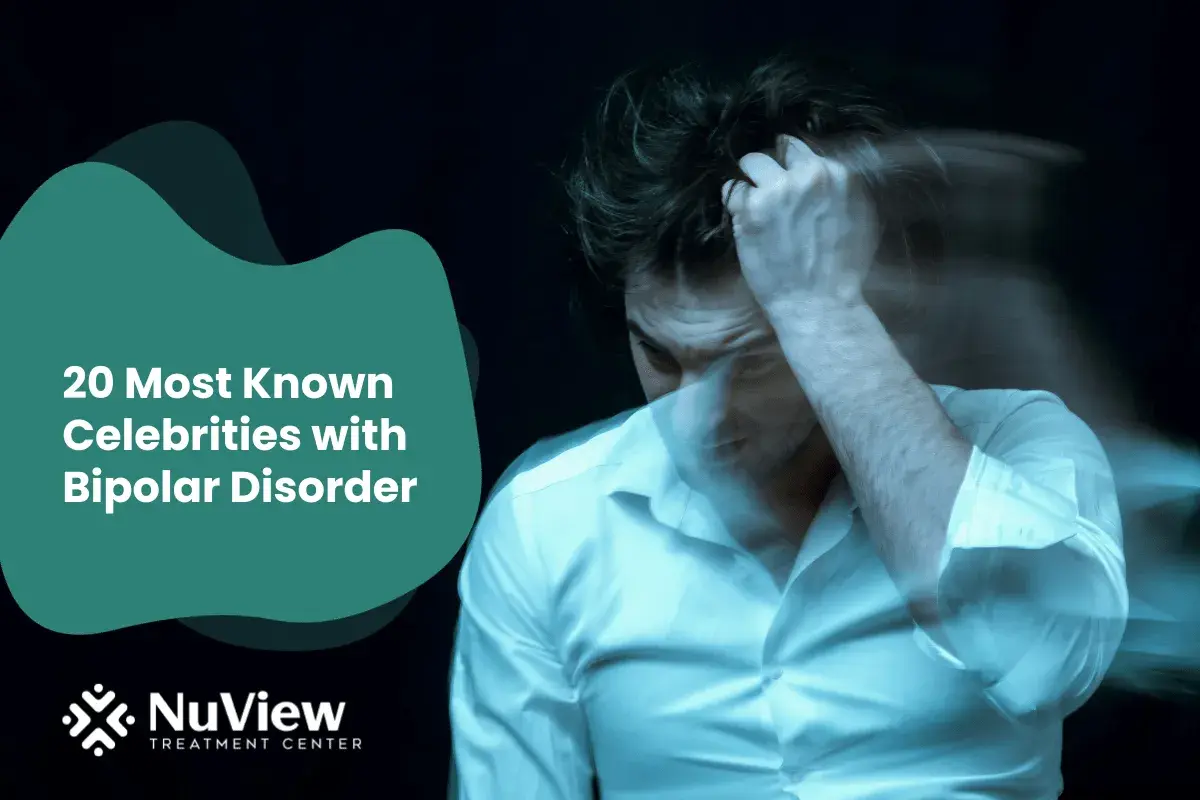
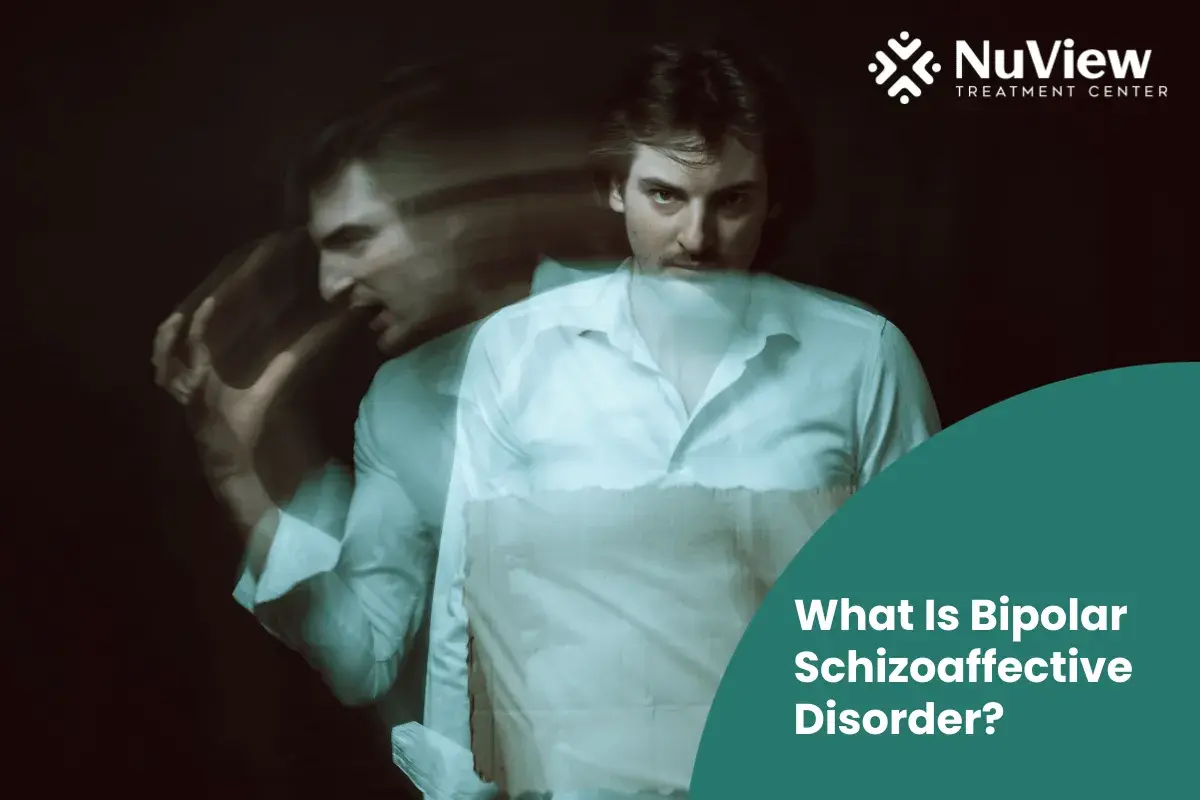
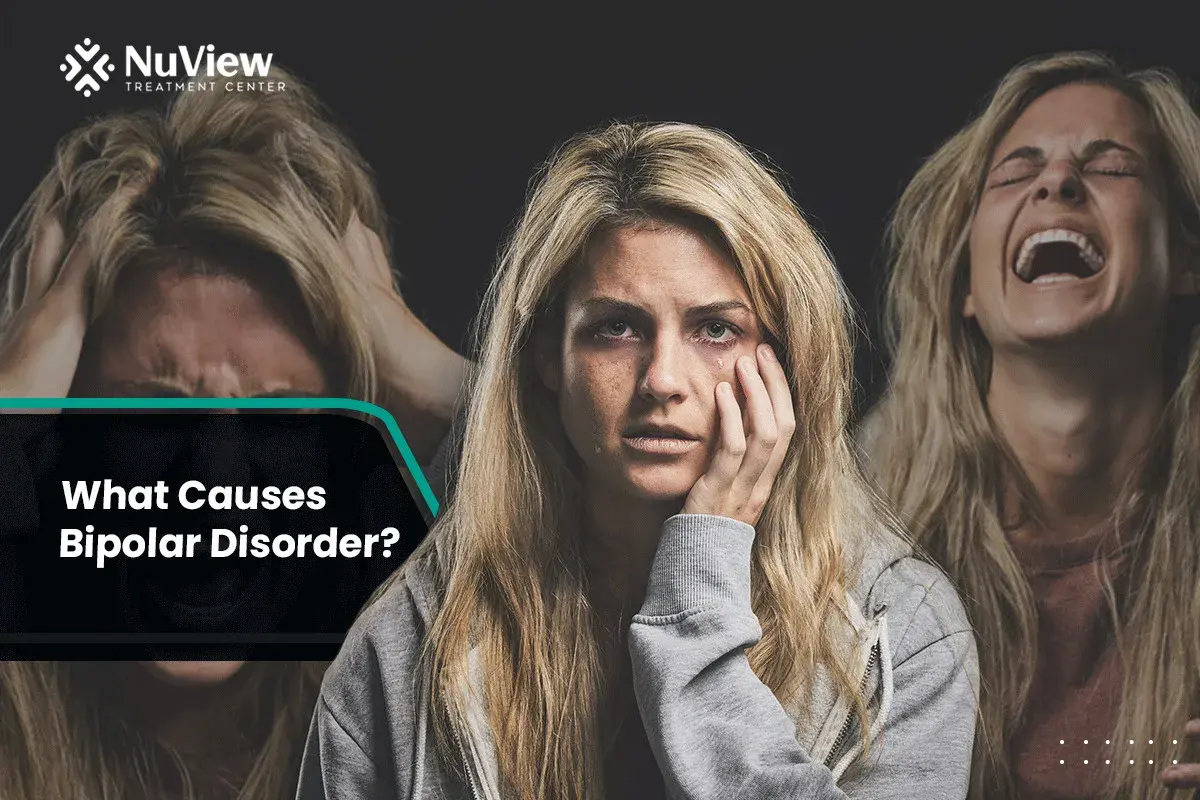



Written By
Dr. Ryan Peterson